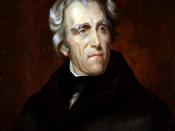During the 1820's and 1830's, the federal government underwent many changes. The time of one party government ended with the formation of the Democratic Party. The Jacksonian Era had many political controversies and slogans, often criticized by the people and media, including the corrupt bargain of the Election of 1824, the Tariff of Abominations (1828), the nickname "King Andrew", and the "Bank Monster". Jackson reacted to the criticism of each policy.
The results of the Election of 1824 sparked rumors of a "corrupt bargain" between John Q. Adams and Henry Clay. Initially, there were five people running for president, but because of the number of candidates, no one could get the majority of electoral votes. Only the top three candidates, Andrew Jackson, John Quincy Adams, and Henry Clay would continue the race. It was left up to the House of Representatives to decide who the president would be. Being the Speaker of the House, Clay persuaded his supporters to vote for Adams since they believed in the same policies.
When Adams won, he appointed Clay his Secretary of State. This led the public to believe that Adams had made a "corrupt bargain" with Clay. Jackson, who had the most electoral votes and the popular vote before Clay helped Adams, lost the election. Jackson's supporters were upset and cried robbed presidency, complaining that the will of people had been ignored since Jackson had the popular vote. During the Adams administration, the irritated Jackson rallied support so he would be elected president in the next election. The critics attacked the corrupt bargain because they wanted Jackson to be president as opposed to Adams.
After the War of 1812 and the Napoleonic Wars, an economic boom spread across Europe. The British manufacturing system grew rapidly and sold goods to America at prices...


